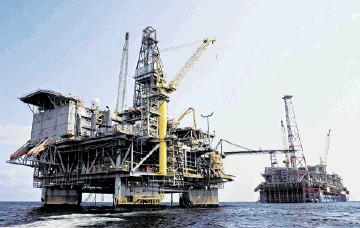
Exxon Mobil Corp. has become the first major US oil company to ship American crude overseas, joining a band of independent traders that are trying to ease a glut at home after a 40-year export ban was lifted.
Exxon shipped US crude into a refinery it owns in Sicily, according to a person familiar with the matter and three traders and ship brokers. The Maran Sagitta oil tanker sailed in early February from Beaumont, Texas, where Exxon operates a refinery. It recently arrived in the Italian port of Augusta.
Until now, trading houses including Vitol Group BV and Trafigura Pte and European-based oil companies have shipped U.S. crude overseas. Exxon is the first American firm that joins the race, which comes as domestic U.S. crude inventories surge to the highest level in nearly 90 years.
“While we do not comment on the details of proprietary commercial agreements, crude exports from the U.S. are now another commercial option that we may elect to exercise from time to time,” Exxon said in an e-mailed statement.
Oil traders are shipping West Texas Intermediate to refiners in the Mediterranean to profit from the difference in crude prices between the two regions. A glut of WTI has pushed up U.S. stockpiles to a record, depressing the price of the U.S. benchmark relative to European Brent crude.
The exports into Europe follow a congressional deal in December to lift a 1970s-era prohibition on overseas shipments and a movement in relative prices between the U.S. and Europe making exports profitable.
“The arbitrage to European refiners for WTI loading promptly currently seems to be open,” Ben Luckock, global head of crude oil at Trafigura said on Feb 22. “A number of vessels of WTI crude oil have recently been fixed to Europe.”
The overseas sales could relieve pressure on storage capacity in the U.S., after stockpiles rose to nearly 518 million barrels last week, the highest level in official data going back to 1930. Inventories at the biggest U.S. oil storage hub in Cushing, Oklahoma climbed to a record above 66 million barrels last week, according to the Energy Information Administration. The site, the delivery point for WTI, has a working capacity of 73 million.
Exxon, together with companies such as Chevron Corp. and Continental Resources, have lobbied vigorously in recent years against the export ban, which blocked all but a fraction of U.S. oil overseas sales. They faced opposition from U.S. domestic refiners, including Valero Energy Corp, which feared the end of the export ban would lift domestic crude prices, undermining their margins.
The ban was imposed in the aftermath of a 1973-74 OPEC oil embargo, which crippled the U.S. economy and brought home the heavy dependence the country had developed on foreign suppliers.
Recommended for you
